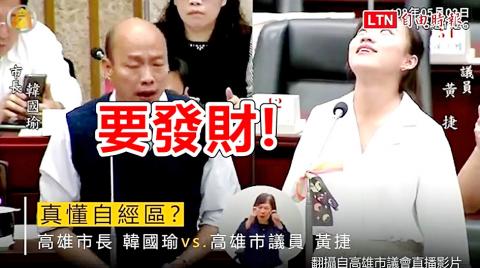Internet searches about a proposal by Kaohsiung Mayor Han Kuo-yu (韓國瑜) to build a free economic zone in the city spiked after Han argued with New Power Party Kaohsiung City Councilor Huang Jie (黃捷) over the plan at a city council meeting on Friday.
Huang demanded clarification on the details of the proposed economic zone, asking: “Specifically what [economic] restrictions does the city government hope to ease?”
Han of the Chinese Nationalist Party (KMT) said that he would provide a detailed report within two days.

Photo: Hung Su-chin, Taipei Times
When pressed for more details, he said: “I am going to make Kaohsiung rich, okay?”
He repeated the same answer as Huang continued to grill him.
“The main goal is to make Kaohsiung rich,” Han said, adding: “I just hope to make Kaohsiung rich, that is my goal.”
Han’s inability to provide concrete details left Taiwanese to research the specifics of the proposed zone on their own, members of the Facebook group “No KMT is Good” (打馬悍將粉絲團) said.
The KMT had made similar proposals in the past, but Han has made the concept even more vague, they said.
“A free economic zone will simply be a place for the Chinese to run rampant,” an Internet user wrote.
“The Chinese will get rich and Taiwanese will be left eating dirt,” another wrote.
Some users said that the proposal is a rehash of a plan suggested by KMT lawmakers during the administration of former president Ma Ying-jeou (馬英九), which failed to pass, despite the party having a legislative majority at the time.
“It is impossible to know everything, so if you do not know, it is okay to say: ‘I don’t know,’” Taipei Mayor Ko Wen-je (柯文哲) said on Saturday when reached for comment on Han’s refusal to provide the plan’s specifics.
Internet fitness celebrity Holger Chen (陳之漢) said that Han was “all talk and no action.”
“It is as if someone asked me how to become stronger and all I told them was: ‘Go to the gym and you will naturally become stronger,’” he said.

Japanese footwear brand Onitsuka Tiger today issued a public apology and said it has suspended an employee amid allegations that the staff member discriminated against a Vietnamese customer at its Taipei 101 store. Posting on the social media platform Threads yesterday, a user said that an employee at the store said that “those shoes are very expensive” when her friend, who is a migrant worker from Vietnam, asked for assistance. The employee then ignored her until she asked again, to which she replied: "We don't have a size 37." The post had amassed nearly 26,000 likes and 916 comments as of this

US President Donald Trump said "it’s up to" Chinese President Xi Jinping (習近平) what China does on Taiwan, but that he would be "very unhappy" with a change in the "status quo," the New York Times said in an interview published yesterday. Xi "considers it to be a part of China, and that’s up to him what he’s going to be doing," Trump told the newspaper on Wednesday. "But I’ve expressed to him that I would be very unhappy if he did that, and I don’t think he’ll do that," he added. "I hope he doesn’t do that." Trump made the comments in

Tourism in Kenting fell to a historic low for the second consecutive year last year, impacting hotels and other local businesses that rely on a steady stream of domestic tourists, the latest data showed. A total of 2.139 million tourists visited Kenting last year, down slightly from 2.14 million in 2024, the data showed. The number of tourists who visited the national park on the Hengchun Peninsula peaked in 2015 at 8.37 million people. That number has been below 2.2 million for two years, although there was a spike in October last year due to multiple long weekends. The occupancy rate for hotels

A cold surge advisory was today issued for 18 cities and counties across Taiwan, with temperatures of below 10°C forecast during the day and into tonight, the Central Weather Administration (CWA) said. New Taipei City, Taipei, Taoyuan and Hsinchu, Miaoli and Yilan counties are expected to experience sustained temperatures of 10°C or lower, the CWA said. Temperatures are likely to temporarily drop below 10°C in most other areas, except Taitung, Pingtung, Penghu and Lienchiang (Matsu) counties, CWA data showed. The cold weather is being caused by a strong continental cold air mass, combined with radiative cooling, a process in which heat escapes from